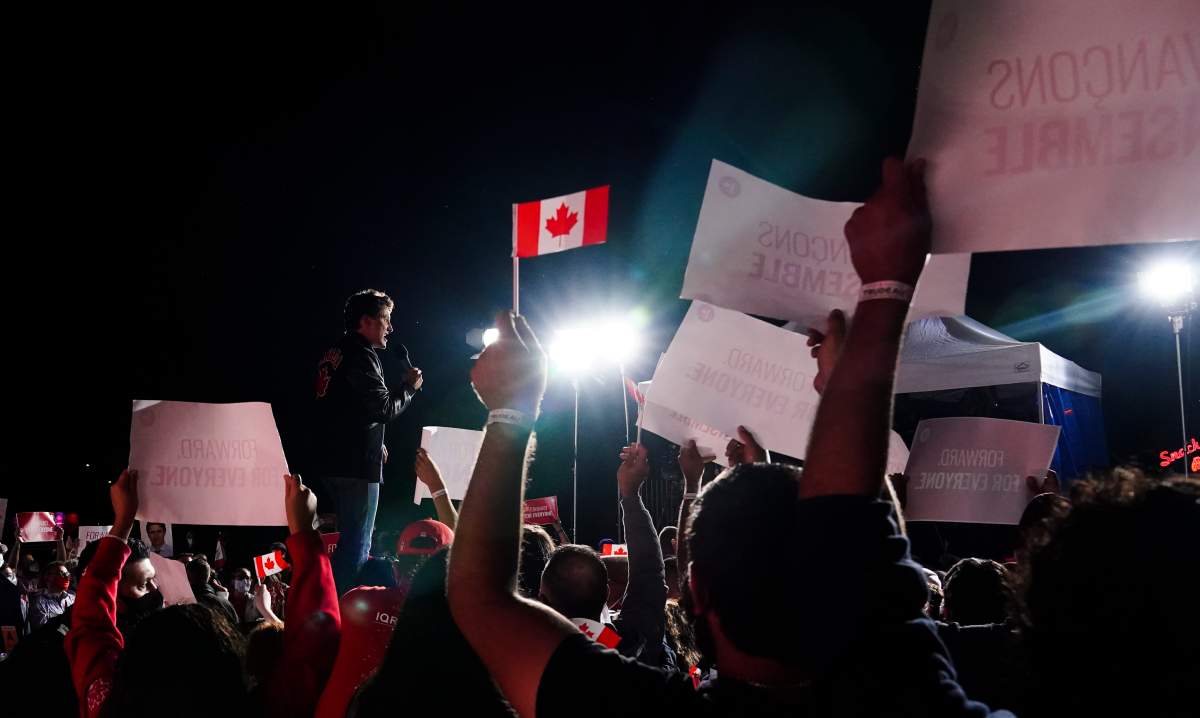The Liberals and Conservatives are in a dead heat in the last week of the Canadian election, according to a new poll done for Global News.

Ipsos found that if the election were held tomorrow, the Liberals and Conservatives would be tied at 32 per cent of the vote, with the Conservatives down three points since the last poll and the Liberals remaining steady.
The poll was held between Sept. 10-13 and involved 2,001 Canadians over 18 years of age.
Out of the Canadians polled, 21 per cent (unchanged) said they would vote NDP, according to Ipsos, while seven per cent (unchanged) went with the Bloc Quebecois, four per cent (up two points) with the Green Party and three per cent (up one point) with the PPC.
Ipsos CEO Darrell Bricker told Global News that the slight fall of support for the Conservatives could be due to a more aggressive Liberal campaign in the last week that has highlighted what Canadians might lose if they are not elected and the risks of an Erin O’Toole leadership.
“Liberals have really turned on the fire in their campaign,” he said. “You’re seeing some of the reaction to that.”
Bricker said the Liberals are trying to “fill in the blanks about the Conservatives in a particularly negative way.”

That includes focusing on women’s access to abortion, firearms and mandatory vaccines.
“It’s a negative type of campaigning, but we’ve seen it in the past, and it’s effective.”

Get breaking National news
While the aggressive tone has got the Liberals tied with the Conservatives, Bricker said it “hasn’t got them growing.”
Instead, they are “fighting for their lives,” he said, which is a very different outcome than the Liberals initially hoped for when they called the election and thought it would be a quick sweep to a majority.
“That’s all collapsed,” Bricker said.
Issues poll
The Ipsos poll also asked Canadians which issues are top-of-mind and found the COVID-19 pandemic came out on top at 30 per cent, followed by affordability and cost of living at 26 per cent and health care at 26 per cent.
The pandemic has grown as a concern by four points since the beginning of the election, while health care has gone down three points and affordability has gone up three points.
The Liberals are seen as the most trusted to tackle the pandemic, according to IPSOS, though that trust has decreased over the course of the election — down six points to 42 per cent.

Bricker said a combination of COVID-19 cases increasing and the Liberals focusing on other issues could be behind the drop in confidence for them to handle the pandemic.
Meanwhile, trust for the NDP to handle certain issues has gone way up — by eight points to 28 per cent for health care, tying for first with the Liberals, and up six points on affordability to 33 per cent, making them the most trusted to tackle that issue.
- ‘At first I cried’: How Iranian Canadians are reacting to the U.S. strikes in Iran
- Iran begins search for new leader; U.S. military says 3 service members killed
- Khamenei’s death met with ‘jubilation’ among Iranian-Canadians: Liberal MP
- Queen’s University students stranded in Doha after Iran attack shuts down airspace
According to Bricker, the NDP are the biggest growers so far in this election, especially in Ontario, which is splitting the progressive vote away from the Liberals.
“What’s happened is the progressive voters are now caught between the NDP and the Liberal Party as the party that can best deliver on the issues that they care most about,” he said.
“What we’ve seen is a continuing improvement in terms of Mr. Singh’s position and his party’s position, and decline in terms of the Liberal Party’s positioning.”
These are some of the findings of an Ipsos poll conducted between September 10 and 13, on behalf of Global News. For this survey, a sample of n = 2,001 Canadians aged 18+ was interviewed. A sample of n = 1,501 was interviewed online, via the Ipsos I-Say panel and non-panel sources, and respondents earn a nominal incentive for their participation. A sample of n = 500 Canadians aged 18+ was interviewed by live-interview telephone interviewers by landline and cellphone, using random-digit dialing. Quotas and weighting were employed to balance demographics to ensure that the sample’s composition reflects that of the adult population according to Census data and to provide results intended to approximate the sample universe. The precision of Ipsos polls which include non-probability sampling is measured using a credibility interval. In this case, the poll is accurate to within ± 2.5 percentage points, 19 times out of 20, had all Canadians been polled. The credibility interval will be wider among subsets of the population. All sample surveys and polls may be subject to other sources of error, including, but not limited to coverage error, and measurement error.








Comments
Want to discuss? Please read our Commenting Policy first.